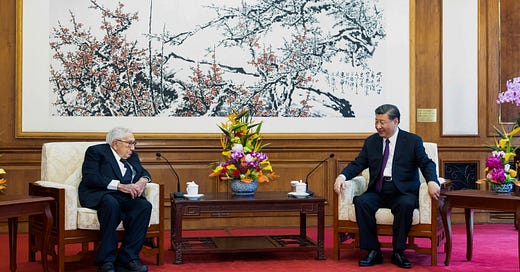Name: Shi Yinhong (时殷弘)
Year of birth: 1951 (age: 72)
Position: Professor of international relations, chairman of the academic committee of the School of International Studies and director of the Centre for American Studies, Renmin University of China
Research focus: International relations with a particular focus on the U.S.
Education: MA (1981) and PhD (1988) from Nanjing University
Source: Phoenix (20.07.2023)
“As far as a significant and long-lasting easing of US-China rivalry on any of the key issues is concerned, the recent back-to-back visits of Blinken, Yellen, and Kerry to China have not yielded any real and substantive results, except perhaps for the strengthening of both sides' willingness to prevent a US-China military conflict.”
“Since late April 2022, the number one policy priority of the United States towards China has been to ensure the absolute prevention and avoidance of a military conflict between the two countries. But China has continued to resist this absolute guarantee, fearing that it would give the United States a free hand to continue to increase its ever more comprehensive support for Taiwan.”
“China also places the prevention and avoidance of a military conflict with the United States among its top national priorities, but relies more on the relevant experience of the frontline forces from both countries and on Washington's ‘cowardice‘ [‘胆怯’].”
“The Chinese Government accorded Kissinger a particularly high level of courtesy in recognition of his historic and crucial contribution to the normalisation of bilateral relations some 50 years ago. This also demonstrates the importance that the Chinese Government attaches to all past, present, and future American individuals who are committed to improving bilateral relations. At the same time, it is highly unlikely that the Chinese Government would use Kissinger, who has long since left the centre of power, as a key mediator to discuss with the US Government major issues on which China's relevant positions have already been repeatedly and clearly expressed, and on which significant and lasting easing [缓解] has time and again proved elusive.”
Name: Wang Yong (王勇)
Year of birth: 1966 (age: 56)
Position: Director of the Centre for American Studies and professor at the School of International Studies, Peking University; Professor at the Party School of the Chinese Ministry of Foreign Affairs.
Research focus: China’s foreign relations; US-China relations; Global political economy
Education: BA (1987), MA (1990), PhD (1996), Peking University
Source: Aisixiang.com
(12.07.2023)
“Yellen's visit, coupled with that of Secretary of State Blinken [a couple of weeks] earlier, marks a certain degree of adjustment in the US’s policy towards China. [However,] the Biden administration's emphasis on pursuing its so-called ‘strategic competition’ with China will not change.”
“Yellen's visit has been conducive to restoring and strengthening the idea that China and the United States still have significant common interests … Yellen is one of the few moderate officials on China within the Biden administration.”
“The Biden administration's current willingness to begin improving US-China relations, including economic relations, is partly an acknowledgement that the US has in fact failed in its tariff and trade war against China. This is because more than 90 per cent of the tariffs imposed by the United States on Chinese exports have ended up being shouldered by American businesses and consumers. At the same time, they have also exacerbated the US’s hard-to-control inflation. More importantly, Yellen recognises that Chinese financial support is indispensable to solving the US's macroeconomic problems, including controlling inflation and the financing of its national debt. Global macroeconomic stability requires cooperation between China and the United States.”
“The Biden administration has now begun to change its strategy towards China, sending senior officials such as Blinken and Yellen to visit China. This is a shift that should be welcomed. However, whether or not the United States is genuinely willing to establish a regular dialogue mechanism to resolve the contradictions and differences that exist between China and the US remains to be seen. Even if the US intends to resume this dialogue mechanism, its strategic misjudgement of China's intentions, as well as its anxiety over, and distrust of, China's rapid development, will remain difficult to change.”
“At present, one can say that before the 2024 US election [race] officially begins, the US-China relationship has a very small ‘window of opportunity’ to improve ties. However, whether Democrats who are currently in office, such as Yellen, will be able to withstand political attacks by China hawks remains an open question.”
“US-China relations will continue to face enormous challenges in the future, and one should not become blindly optimistic [simply] because of the current improvement in US-China exchanges. The main challenge will come from the hardliners in the US who will continue to push for the deterioration of US-China ties, both for the sake of domestic electoral interests and to preserve the US’s [global] hegemony. What's more, interest groups such as those within the US military-industrial complex will continue to create crises and newsworthy events [新闻事件] so as to hijack [绑架: lit. kidnap] the US’s China policy. This China-related political ecology within the United States will be difficult to change. Coupled with the possibility that Trump may win the 2024 election and return with a vengeance, the future of US-China relations will be full of uncertainty.”
“Hope for US-China relations ulies in the maintenance and expansion of civilian engagement between both countries .. The three-year epidemic has had too great an impact on exchanges between China and the United States. We must face up to this and take more proactive measures.”





